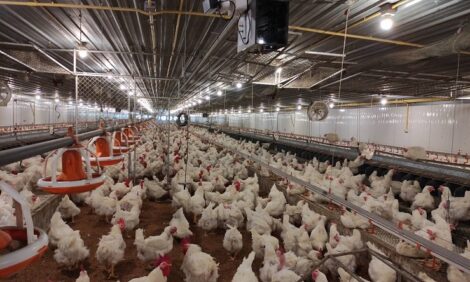



Scientist Thinks Nigerian Bird Flu Virus Results from Unregulated Trade
GLOBAL - Scientists are doubtful that the latest disease-producing strain of avian flu detected in Nigeria originated with wild migratory birds that annually migrate there from Europe or Central Asia.They say the newly discovered strain most likely stems from the illicit or unreported trade of domestic poultry across borders, a process that can be monitored and regulated if governments and health authorities work to implement stronger, protective safeguards, according to Voice of America.
* "This particular strain that has just hit Nigeria has hit well before the migratory movement of birds heading south from Europe and Asia, and so therefore, it's not likely at all that wild birds played a role in this new outbreak" |
|
Dr Kristine Smith, assistant director of the Wildlife Conservation Society’s Global Health Programs
|
Dr Kristine Smith is Assistant Director of the Wildlife Conservation Society’s Global Health Programs. She says that the current Class Three wave of bird influenza means a loss of trade and the precautionary destruction of thousands of domestic poultry.
"For Nigeria in particular, it's been quite serious as far as their economy goes and the direct impact on their poultry industry. H5N1 being a zoonotic disease, meaning infectious to humans, it continues to pose a threat to human health. These highly pathogenic H5N1 strains, as far as Nigeria is concerned, we are watching it quite closely in the poultry markets because it obviously is a food security issue," she said.
Dr Smith says the reason that scientists who are tracking the spread of the disease are dispelling reports of wild bird migrations causing the current bout in Nigeria is that it has been shown that this year's migration season has not yet begun.
"What we have suspected has caused most of the outbreaks has been through the movement of domestic poultry – domestic chickens or domestic ducks. These animals are moved both legally and illegally within a nation and internationally, and that is how this disease spreads quite a bit. However, wild birds have played a relatively small role in moving the disease from country to country during their migration movements; however, a lot of those times, those infections don't result in larger infections of poultry and people. This particular strain that has just hit Nigeria has hit well before the migratory movement of birds heading south from Europe and Asia, and so therefore, it's not likely at all that wild birds played a role in this new outbreak," she stated.
The Wildlife Conservation Society, which is based at New York’s famed Bronx Zoo, continues to make a serious effort to heighten awareness of the need to trace how poultry enters our food supply system. Calling illegal food trade across borders a multi-billion-dollar industry "comparable to the international drug trade," Dr Smith says the threat posed by shipping poultry to markets domestically and across borders today is greater than ever before.
"It’s huge, and it's not limited to poultry and even influenza, but both legal and illegal movement of domestic and wildlife animals and products is largely unrecorded and unregulated and undefined. And given the increased globalisation of today’s world, where we have much more contact with different species of animals, wildlife, and livestock and humans, with the trade, we’re seeing an increase in occurrence of these major infectious diseases," she notes.
Dr Smith, a field veterinarian, credits the capability of Nigerian authorities to curb the spread of the influenza.
"Nigeria has been one of those countries that have been wonderfully working very diligently - their government, with their internal forces and external international assistance. And they're doing a wonderful job of responding to these outbreaks," she says.
Dr Smith points to some advantages that Nigeria has that have enabled its medical and civil authorities to contain the country's multiple outbreaks effectively.
"Sometimes, even though a developing country may have a little bit less infrastructure, sometimes it's easier for them to contain some of these outbreaks because you don't have the highways, you don't have so many commercial poultry farms, where you have people moving from one to another constantly. And so in some ways, it's almost easier to keep a handle on some of these outbreaks in developing countries as opposed to more developed countries. But it always varies on the type of outbreak that occurs, where it occurs, and in what species it occurs," she notes.
Although vaccines to lessen the severity of the illness continue to be developed, Dr Smith notes that the virus is constantly adapting and unfolding in new strains. While the impact of bird flu has thankfully not reached the dreaded levels that were feared two and three years ago, more work remains to be done to find a definitive explanation of how the avian influenza makes its way to countries like Nigeria or to countries like Egypt and Indonesia, where it has taken an even greater economic and human toll.
Further Reading
| - | You can visit the Avian Flu page by clicking here. |








